Best Mini PC For Home Server: Build A Home Lab At Low Costs
Explore top mini PCs for home servers. Compare Intel, AMD, and ARM options for streaming, NAS, and more. Find your ideal home lab setup.
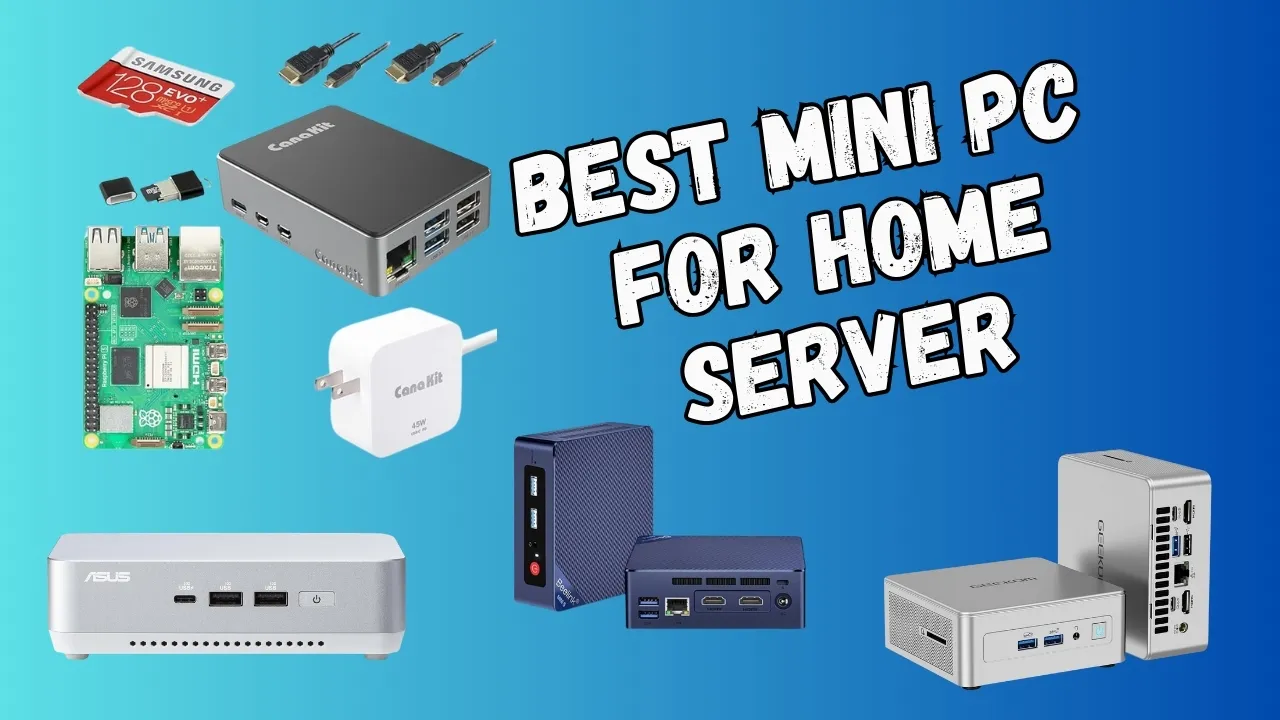
In the era of digital transformation, home servers have become increasingly popular among tech enthusiasts and homeowners alike. A home server acts as a central hub for managing various digital tasks, from storing and streaming media to hosting personal websites and automating home devices. As the demand for compact, energy-efficient, and cost-effective solutions grows, mini PCs have emerged as an excellent choice for building home servers.
I have an N100 Mini PC at my home where I host a couple of services like file sharing, or media streaming and is enough for the basic things. Other then this I am using it to host various docker apps that I present also on my website so I know this subject preaty well.
Purpose of a home server
A home server serves multiple purposes, catering to the diverse needs of modern households:
- Centralized file storage and backup
- Media streaming and management
- Personal cloud services
- Home automation control
- Web hosting and development environment
- Network-attached storage (NAS)
- Virtual machine hosting for testing and learning
You can check Best 100+ Docker Containers for Home Server to see what apps can be hosted with the help of docker.
Benefits of a mini PC for home server
In case you are interested to monitor server resources like CPU, memory, disk space you can check: How To Monitor Server and Docker Resources
Mini PCs offer several advantages when used as home servers:
- Compact size: Takes up minimal space in your home
- Energy efficiency: Consumes less power compared to traditional servers
- Quiet operation: Ideal for 24/7 use in living spaces
- Cost-effectiveness: More affordable than full-sized servers or custom builds
- Versatility: Can be repurposed for other tasks if needed
- Easy maintenance: Simple to upgrade and service
- Low heat output: Reduces cooling requirements
By leveraging a mini PC for your home server, you can enjoy the benefits of a powerful, centralized system without the drawbacks of larger, more complex setups.
Moreover, mini PCs can be easily categorized into two main types: ARM-based and X86-based systems. The choice between these depends on specific needs and the desired level of compatibility with certain applications.
Additionally, setting up a home lab using a mini PC as a server can be a valuable educational experience. It allows users to try new technologies, experiment with different operating systems, and gain hands-on experience in managing and configuring networks and servers. This practical knowledge can be beneficial for both personal and professional development, especially for those interested in IT and computing fields.
If you are interested to see some free cool open source self hosted apps you can check toolhunt.net self hosted section.
Factors to Consider
When selecting a mini PC for your home server, several key factors should influence your decision:
RAM and CPU specification (ARM, X86)
- RAM: Consider at least 8GB for basic tasks, 16GB or more for demanding applications, even more if you have the budget.
- CPU: Choose between ARM and X86 architectures
- ARM: Generally more energy-efficient, but may have software compatibility limitations
- X86: Wider software compatibility, typically higher performance but more power-hungry
- Look for multi-core processors to handle multiple tasks efficiently
Storage capacity
- Consider SSDs for faster performance and reliability
- Determine your storage needs based on intended use (e.g., media server, backups)
- Look for models with expandable storage options or multiple drive bays
Connectivity options (e.g., USB ports, Ethernet, Wi-Fi)
- Ethernet: Gigabit Ethernet is essential; consider models with dual NICs for improved network performance
- USB ports: Ensure sufficient ports for external devices and expansion
- Wi-Fi: Built-in Wi-Fi can be convenient, but wired connections are generally more reliable for servers
- HDMI or DisplayPort: Useful for initial setup and troubleshooting
Power consumption and energy efficiency
- Look for energy-efficient processors and components
- Consider the long-term running costs, especially for 24/7 operation
- Fanless designs can offer silent operation and lower power consumption
Cost
- Balance initial purchase price with long-term value
- Consider the total cost of ownership, including power consumption and potential upgrades
- Evaluate the cost-effectiveness of building your own vs. buying a pre-built system
By carefully considering these factors, you can select a mini PC that best suits your home server needs while optimizing performance, efficiency, and cost.
Recommended Mini PCs for Home Server
| Product | CPU | RAM | Storage | Connectivity | Ideal For | Power Consumption (Approx.) | Quick Link | Price Range |
|---|---|---|---|---|---|---|---|---|
| GMKtec Mini PC | Intel N100 (4C/4T) | 16GB DDR4 | 1TB NVMe SSD | Wi-Fi 6, BT 5.2, Gigabit Ethernet | Basic home server, Office tasks | 10-25W | Details | $ |
| Beelink S12 Pro | Intel N100 (4C/4T) | 16GB DDR4 | 512GB NVMe SSD | Dual Ethernet, Wi-Fi 6, BT 5.2 | Basic home server, Media streaming | 10-25W | Details | $ |
| TRIGKEY Micro Computer | Intel N100 (4C/4T) | 16GB DDR4 | 500GB M.2 SSD | Dual Ethernet, Wi-Fi 6, BT 5.2 | File sharing, Basic NAS | 10-25W | Details | $ |
| ZOTAC ZBOX CI337 nano | Intel N100 (4C/4T) | Up to 32GB DDR4 | Supports 2.5” & M.2 | Dual Ethernet, Wi-Fi 6, BT 5.2 | Silent operation, Customizable storage | 10-25W | Details | $ |
| Intel NUC13 Pro | i5-1340P (12C/16T) | 16GB DDR4 | 512GB NVMe SSD | TB4, Wi-Fi 6E, BT 5.3 | Virtualization, Advanced media server | 20-60W | Details | $$$ |
| ASUS NUC Pro 14 Ultra 5 | Intel Ultra 5 125H (14C/18T) | 32GB DDR5 | 512GB NVMe SSD | TB4, Wi-Fi 6E, BT 5.3 | AI tasks, High-performance server | 25-65W | Details | $$$$ |
| ASUS NUC 14 Pro+ | Core Ultra 9 185H (16C/22T) | Up to 96GB DDR5 | Multiple M.2 slots | TB4, Wi-Fi 6E, BT 5.3 | Extreme performance, Multiple VMs | 30-75W | Details | $$$$ |
| ACEMAGICIAN Mini PC | Ryzen 7 5800U (8C/16T) | 16GB DDR4 | 512GB SSD | Dual Ethernet, Wi-Fi 6, BT 5.2 | Multi-tasking, Media transcoding | 15-45W | Details | $$ |
| GEEKOM AE7 Mini PC | Ryzen 9 7940HS (8C/16T) | Up to 64GB DDR5 | Multiple M.2 slots | TB4, Wi-Fi 6E, BT 5.2 | High-performance tasks, Development | 20-55W | Details | $$$ |
| Orange Pi 5 Plus | RK3588 (8C) | 32GB LPDDR4X | 256GB eMMC | Dual Gigabit Ethernet, Wi-Fi 6, BT | Low-power server, Development | 5-15W | Details | $ |
| CanaKit Raspberry Pi 5 | BCM2712 (4C) | 8GB LPDDR4X | 128GB microSD | Dual Gigabit Ethernet, Wi-Fi 6, BT 5.0 | Low-power services, Learning | 5-15W | Details | $ |
| Apple Mac Mini M2 | M2 (8C CPU/10C GPU) | 8GB (up to 24GB) | 256GB-2TB SSD | TB4, Wi-Fi 6E, BT 5.3 | macOS server, Energy-efficient tasks | 10-35W | Details | $$$ |
Price Range Key: $ = Budget-friendly $$ = Mid-range $$$ = High-end $$$$ = Premium
ARM vs X86
When choosing a mini PC for your home server, one of the fundamental decisions is between ARM and X86 architectures:
ARM:
- Pros:
- Excellent energy efficiency
- Lower heat generation
- Often more affordable
- Ideal for always-on, low-power servers
- Cons:
- Limited software compatibility compared to X86
- Generally lower performance for complex tasks
- Fewer high-performance options available
X86:
- Pros:
- Wide software compatibility
- Higher performance capabilities
- More options available across various price points
- Better suited for virtualization and demanding applications
- Cons:
- Typically higher power consumption
- Can generate more heat, potentially requiring active cooling
- Often more expensive than comparable ARM options
Choose ARM if you prioritize energy efficiency and have simple server needs. Opt for X86 if you require broader software compatibility or plan to run more demanding applications on your home server.
N100 CPU Mini PC (Cheaper)
GMKtec Mini PC, Intel N100 Windows 11 Pro
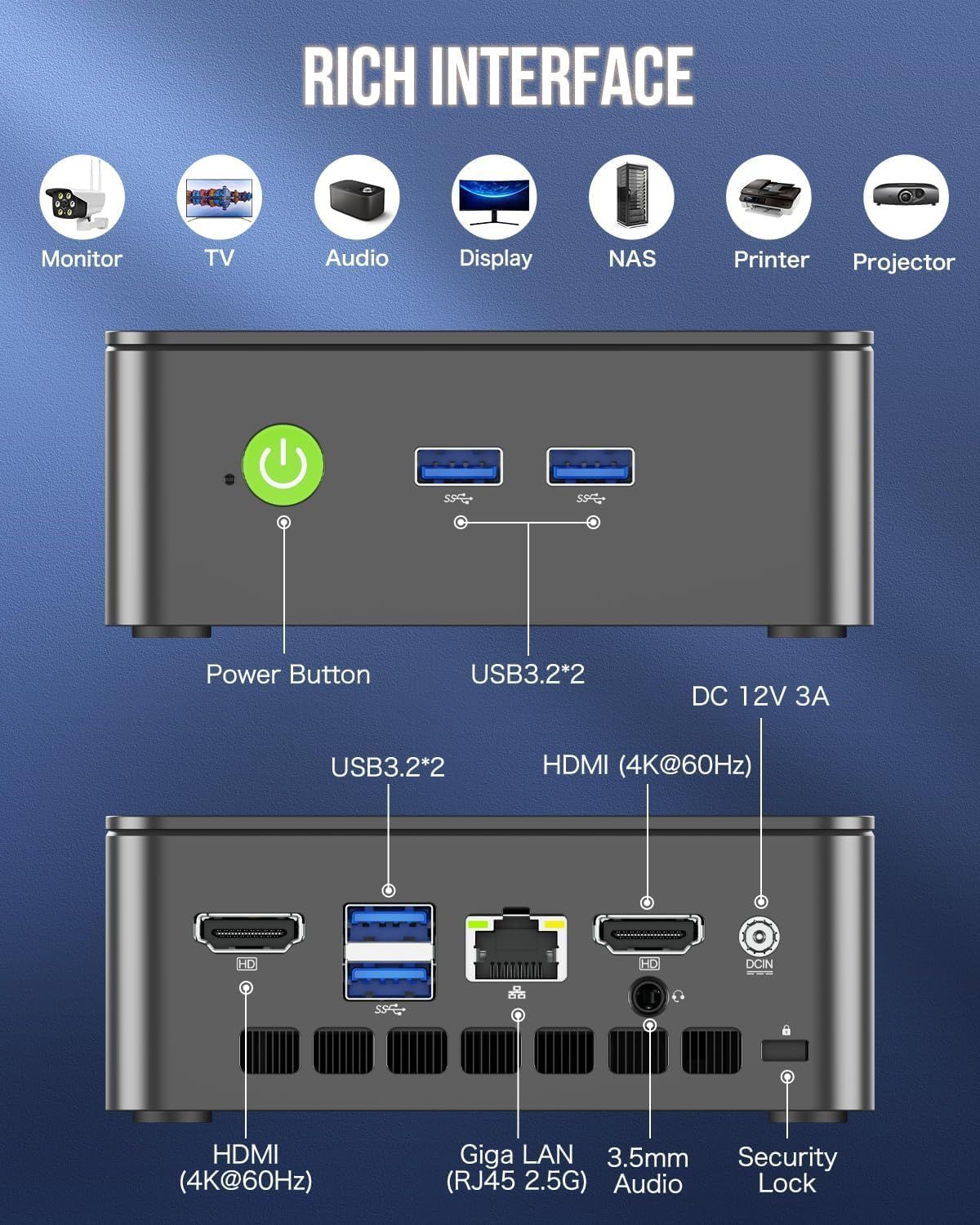
The GMKtec Mini PC offers a compelling balance of performance and affordability, powered by the efficient Intel N100 processor. This compact device comes pre-installed with Windows 11 Pro, making it ready for immediate use in home server applications. With 16GB of DDR4 RAM and a spacious 1TB NVMe SSD, it provides ample resources for various tasks, from file sharing to light media streaming. The inclusion of Wi-Fi 6 and Bluetooth 5.2 ensures robust wireless connectivity, while the Gigabit Ethernet port caters to more demanding network applications.
Features:
- Intel N100 CPU (4 cores, 4 threads, up to 3.4GHz)
- 16GB DDR4 RAM
- 1TB PCIe M.2 NVMe SSD
- Wi-Fi 6 and Bluetooth 5.2
- Gigabit Ethernet
- 4K Dual HDMI display support
- Multiple USB 3.2 ports
- Windows 11 Pro pre-installed
Why it’s good for home server:
- Energy-efficient processor suitable for 24/7 operation
- Large built-in storage capacity
- Windows environment familiar to many users
- Compact size ideal for small spaces
- Capable of handling basic server tasks and office applications
Why it might not be for others:
- Limited upgradeability
- May struggle with intensive tasks like multiple 4K transcodes
- Not as customizable as some barebones options
Beelink S12 Pro Mini PC, Intel 12th Gen Alder Lake- N100
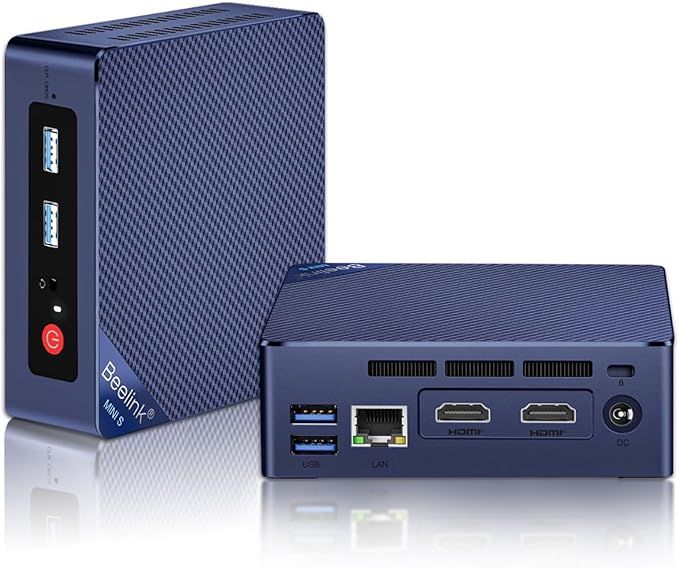
The Beelink S12 Pro is a compact and versatile mini PC that offers a strong balance of performance and energy efficiency, powered by Intel’s 12th Gen Alder Lake-N100 processor. Its small form factor makes it an ideal choice for users looking to set up a home server without consuming too much space or budget. The S12 Pro features dual Ethernet ports, which provide network redundancy and the option for link aggregation, enhancing reliability for home server setups. With expandable RAM and storage options, this mini PC can adapt to various needs, starting as a basic file server and potentially evolving into a more complex home automation hub or media server.
Features:
- Intel N100 CPU (4 cores, 4 threads, up to 3.4GHz)
- 16GB DDR4 RAM
- 512GB NVMe SSD
- Dual Ethernet ports
- Wi-Fi 6 and Bluetooth 5.2
- Multiple USB ports, including USB 3.2
- Dual HDMI outputs
- Compact form factor (124 x 113 x 41 mm)
Why it’s good for home server:
- Energy-efficient processor suitable for 24/7 operation
- Dual Ethernet for improved network performance or redundancy
- Compact size ideal for small spaces or discreet placement
- Silent operation due to low heat generation
- Expandable storage options for growing data needs
- Wi-Fi 6 support for high-speed wireless connectivity
Why it might not be for others:
- Limited CPU power for resource-intensive tasks like real-time video transcoding
- May struggle with multiple simultaneous transcoding jobs for media servers
- Not suitable for heavy virtualization workloads or running multiple VMs
- Graphics performance may be insufficient for GPU-accelerated tasks
Overall, the Beelink S12 Pro is a cost-effective solution for light computing tasks, home servers, and media playback, but users should be aware of its limitations in high-performance scenarios.
Check ITTRIGKEY Micro Computer 12th Gen Intel N100 4C/4T 16G DDR4 500G M.2
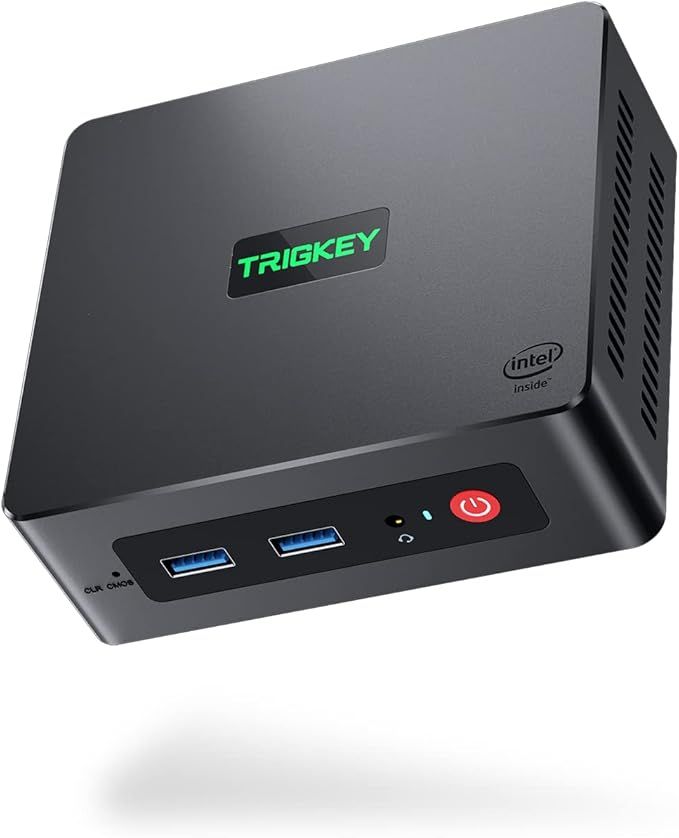
The TRIGKEY Micro Computer is a robust mini PC solution that comes well-equipped out of the box. Featuring the efficient Intel N100 processor, this compact powerhouse offers a generous 16GB of RAM and a spacious 500GB M.2 SSD, providing ample resources for a variety of home server applications. Its metal chassis not only gives it a premium feel but also aids in heat dissipation, contributing to its stability during extended use. The dual Ethernet ports make it a strong contender for network-intensive tasks, while the inclusion of Wi-Fi 6 ensures fast wireless connectivity when needed. This mini PC strikes a balance between performance, storage, and connectivity, making it a versatile choice for users who want a ready-to-go solution with room for future expansion.
Features:
- Intel N100 CPU (4 cores, 4 threads)
- 16GB DDR4 RAM
- 500GB M.2 SSD
- Dual Ethernet ports
- Wi-Fi 6 and Bluetooth 5.2
- Compact metal chassis for better heat dissipation
- Multiple USB ports for peripheral connectivity
- HDMI and DisplayPort for dual-monitor support
Why it’s good for home server:
- Higher RAM and storage capacity for improved multitasking and data storage
- Energy-efficient design for continuous operation
- Dual LAN ports for network redundancy or link aggregation
- Sufficient storage for basic media server needs or file sharing
- Metal chassis aids in passive cooling for stable 24/7 operation
- Pre-configured system reduces setup time
Why it might not be for others:
- CPU may be underpowered for heavy server applications or databases
- Limited upgradeability compared to larger systems or custom builds
- Not suitable for GPU-intensive tasks or gaming server applications
- May be overkill for very basic NAS or file-sharing needs
Overall, the TRIGKEY Micro Computer is a compelling option for users seeking a compact and efficient mini PC for home server tasks and general computing needs.
Check ITZOTAC ZBOX CI337 nano Fanless Silent Mini PC Intel Processor N100
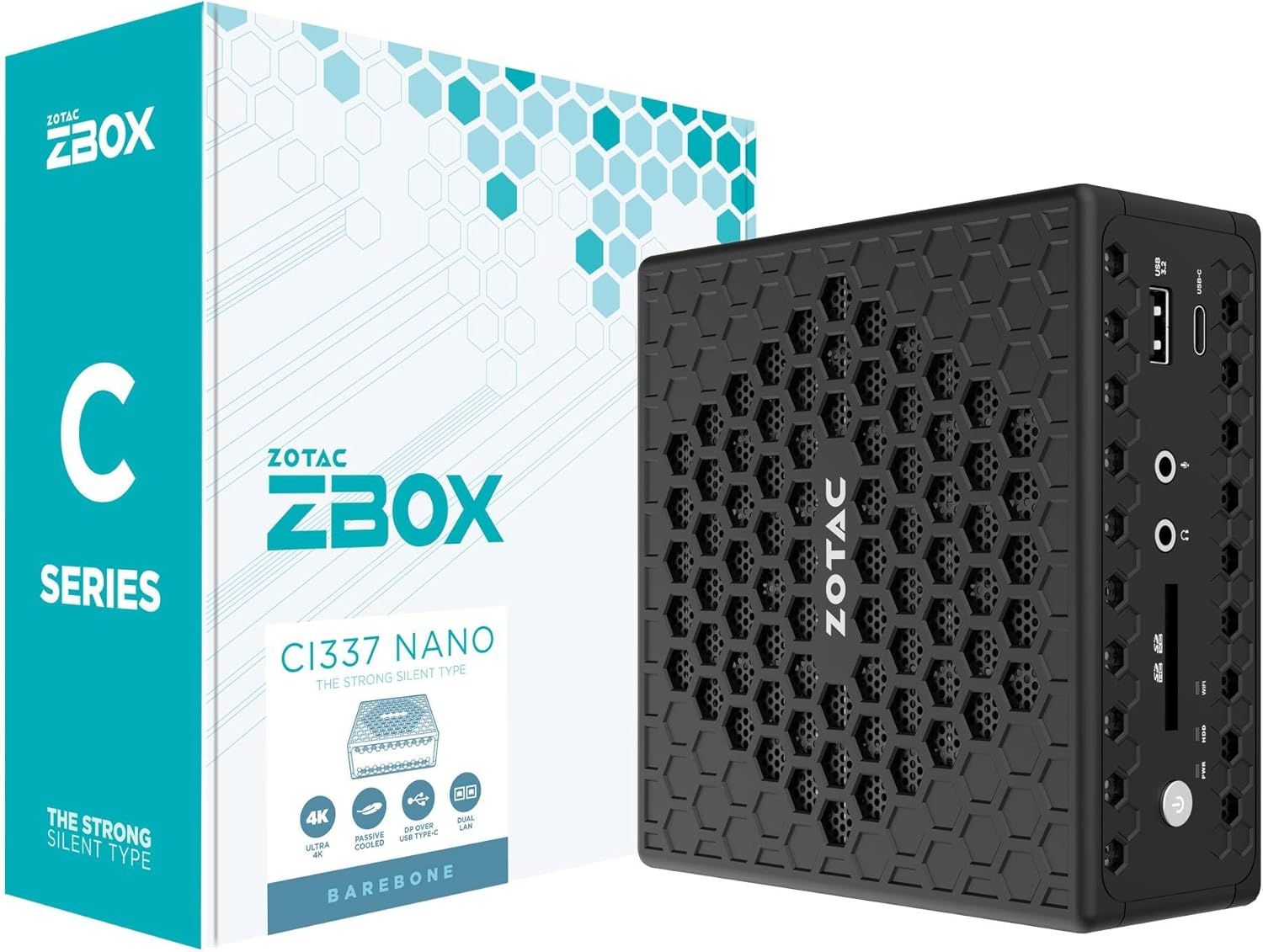
The ZOTAC ZBOX CI337 nano stands out in the mini PC market with its completely fanless design, offering silent operation that’s perfect for noise-sensitive environments. This compact powerhouse utilizes the efficient Intel N100 processor, balancing performance with energy efficiency. Its passively cooled system not only ensures quiet operation but also increases reliability by eliminating moving parts. The CI337 nano’s flexibility shines through its support for both 2.5” drives and M.2 SSDs, allowing users to customize their storage setup. While it comes as a barebones unit, this approach offers the advantage of personalized configuration, letting users choose their preferred RAM and storage options. The dual Ethernet ports and Wi-Fi 6 support make it a versatile networking device, suitable for various home server applications where silent operation is paramount.
Features:
- Intel N100 CPU (4 cores, 4 threads)
- Supports up to 32GB DDR4 RAM
- Supports 2.5” SSD/HDD and M.2 SSD
- Dual Ethernet ports
- Wi-Fi 6 and Bluetooth 5.2
- Completely fanless design for silent operation
- Compact form factor (127.8 x 126.7 x 56.8mm)
- HDMI and DisplayPort outputs
Why it’s good for home server:
- Fanless design ensures silent 24/7 operation, ideal for living areas
- Flexible storage options for customization of capacity and performance
- Compact form factor for space-constrained setups or discreet placement
- Low power consumption for energy efficiency and reduced operating costs
- Dual Ethernet for improved network capabilities or redundancy
- Barebones model allows for personalized configuration
Why it might not be for others:
- Barebones model requires separate purchase of RAM and storage, increasing initial setup effort
- Limited CPU performance for demanding server applications or heavy multitasking
- Passive cooling may limit sustained performance under heavy loads in warm environments
- Lack of dedicated GPU limits uses for graphics-intensive applications
- Initial cost may be higher when factoring in additional components for a complete system
Intel More Powerful Mini PC
Intel NUC13 Pro NUC13ANHi5 16GB RAM 512GB SSD Mini PC
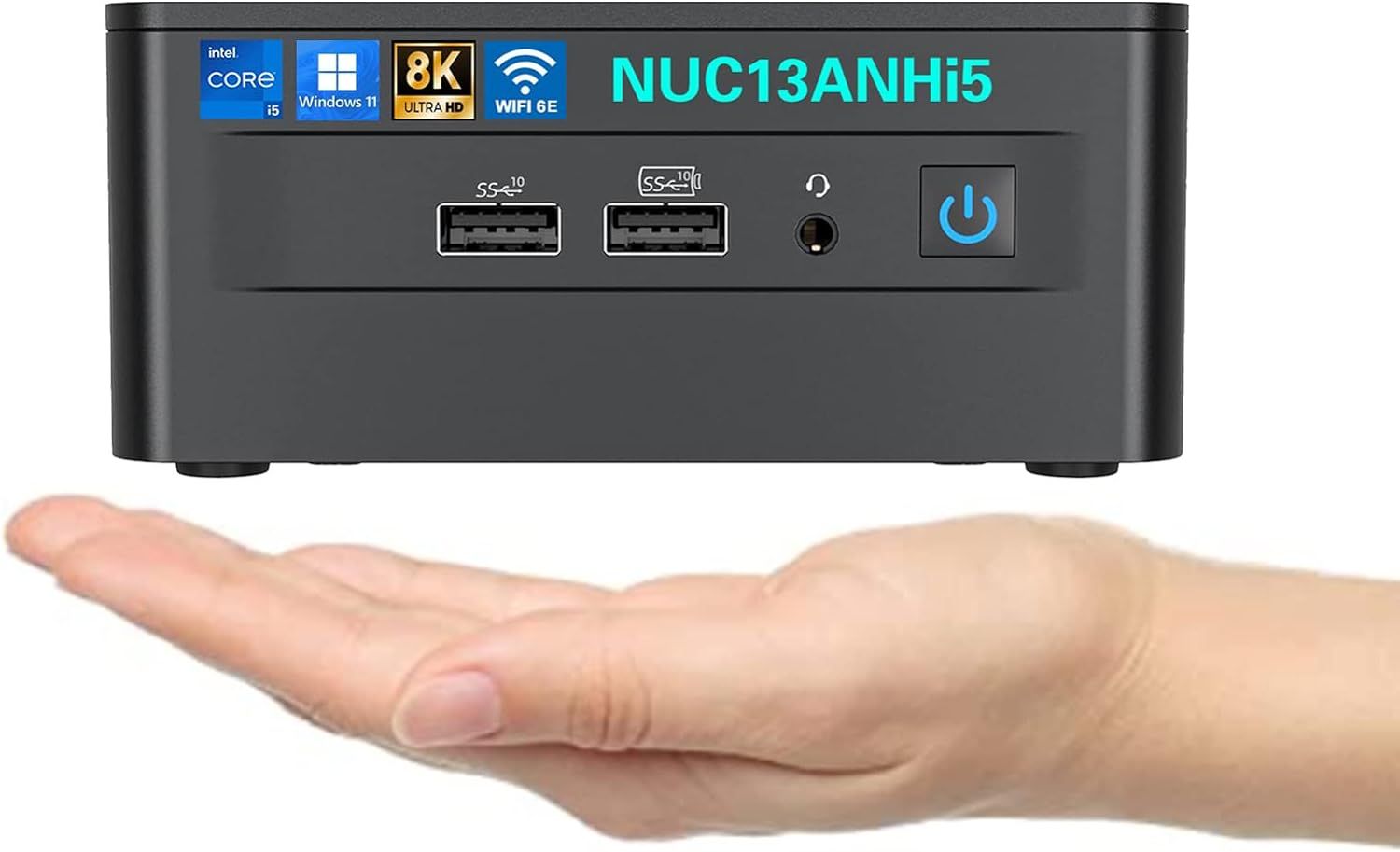
The Intel NUC13 Pro NUC13ANHi5 represents a significant step up in performance for mini PCs. Powered by the robust Intel Core i5-1340P processor, this compact powerhouse offers 12 cores and 16 threads, making it capable of handling demanding server tasks with ease. The included 16GB of RAM and 512GB SSD provide a solid foundation for various applications, from virtualization to media transcoding. Intel’s vPro technology adds an extra layer of security and manageability, making this NUC an excellent choice for both home and small business environments. The inclusion of Thunderbolt 4 ports offers blazing-fast data transfer speeds and the ability to connect high-performance external devices, expanding its capabilities even further. Despite its powerful internals, the NUC13 Pro maintains a small footprint, making it suitable for space-constrained setups.
Features:
- Intel Core i5-1340P (12 cores, 16 threads)
- 16GB DDR4 RAM (expandable)
- 512GB NVMe SSD
- Thunderbolt 4 ports
- Intel vPro technology
- Wi-Fi 6E and Bluetooth 5.3
- Multiple USB ports including USB 3.2 Gen 2
- HDMI 2.0b and DisplayPort 1.4a
Why it’s good for home server:
- High-performance processor capable of handling multiple server roles simultaneously
- Thunderbolt 4 support for ultra-fast external storage or device connectivity
- Intel vPro for enhanced security and remote management
- Compact size despite powerful internals
- Suitable for virtualization and running multiple VMs
- Can handle real-time media transcoding for home media servers
Why it might not be for others:
- Higher power consumption compared to N100-based systems
- More expensive than entry-level mini PCs
- May generate more heat, potentially requiring better ventilation
- Overkill for basic file sharing or simple web hosting tasks
ASUS NUC Pro 14 Ultra 5 AI Mini Desktop
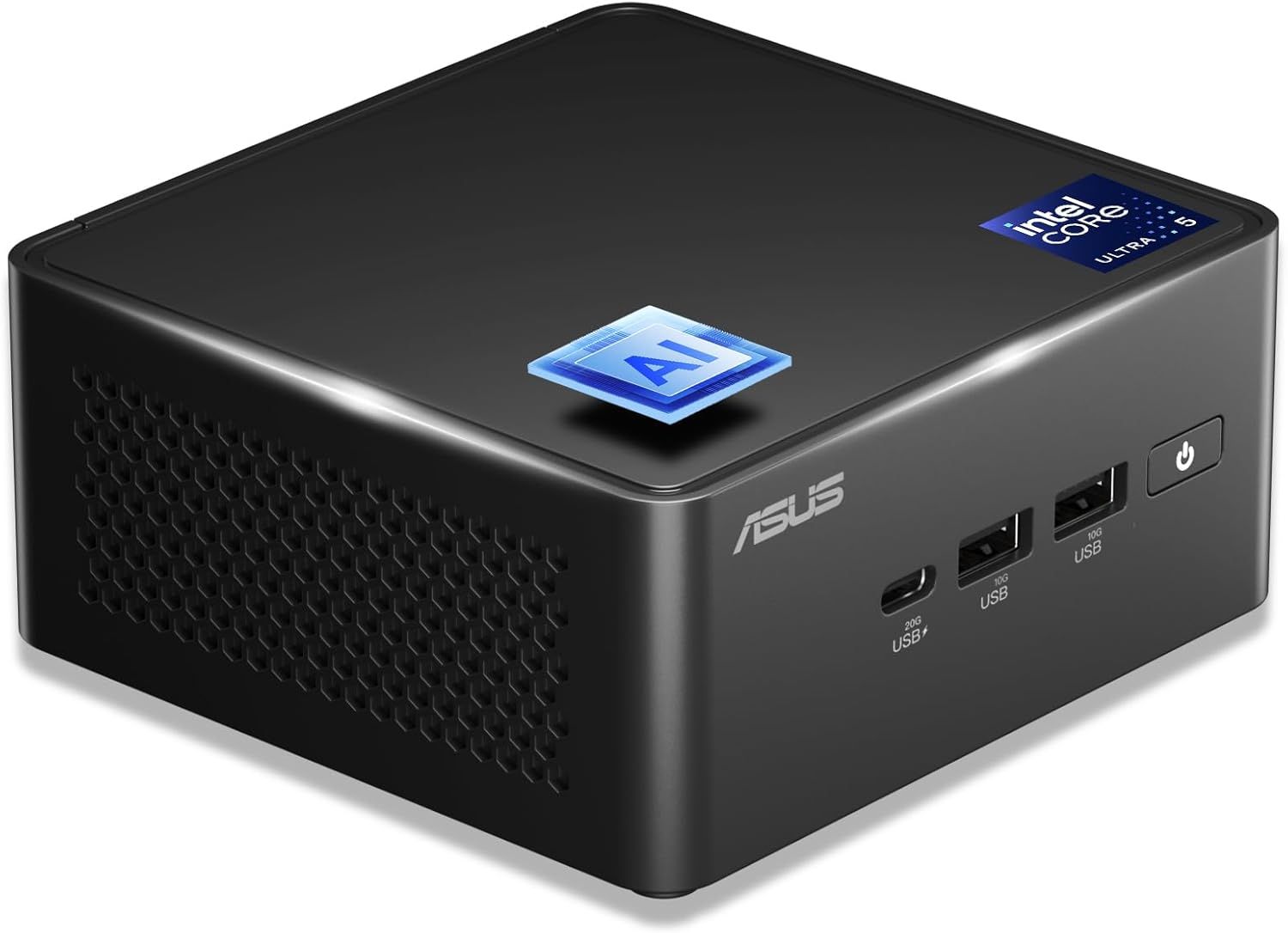
The ASUS NUC Pro 14 Ultra 5 AI Mini Desktop brings cutting-edge technology to the mini PC form factor. Featuring the Intel Ultra 5 125H processor, this compact machine is designed to handle AI-accelerated tasks alongside traditional computing workloads. The inclusion of 32GB DDR5 RAM and a 512GB SSD ensures snappy performance across a wide range of applications. This NUC stands out with its AI capabilities, making it future-proof for emerging technologies and applications in home server environments. The combination of Thunderbolt 4, Wi-Fi 6E, and Bluetooth 5.3 provides versatile connectivity options, allowing it to serve as a central hub for various home networking and automation tasks. Its compact yet powerful nature makes it an ideal choice for users looking to leverage AI capabilities in their home server setup without sacrificing space.
Features:
- Intel Ultra 5 125H processor with AI acceleration (14 cores, 18 threads)
- 32GB DDR5 RAM
- 512GB NVMe SSD
- Thunderbolt 4 connectivity
- Wi-Fi 6E and Bluetooth 5.3
- Multiple USB ports and display outputs
- Compact form factor
- ASUS-specific cooling and power management features
Why it’s good for home server:
- AI acceleration capabilities for future-proofing and advanced tasks
- High-performance processor suitable for multitasking and demanding applications
- DDR5 RAM for improved memory performance
- Excellent connectivity options for versatile home server setups
- Compact size allows for flexible placement options
- Capable of handling complex home automation and media server tasks
Why it might not be for others:
- Higher price point compared to basic mini PCs
- May be overkill for simple file sharing or basic web hosting needs
- Potentially higher power consumption than more basic models
- AI capabilities may not be utilized in all home server scenarios
ASUS NUC 14 Pro+ Barebone with Intel 14thGen Core Ultra 9 185H
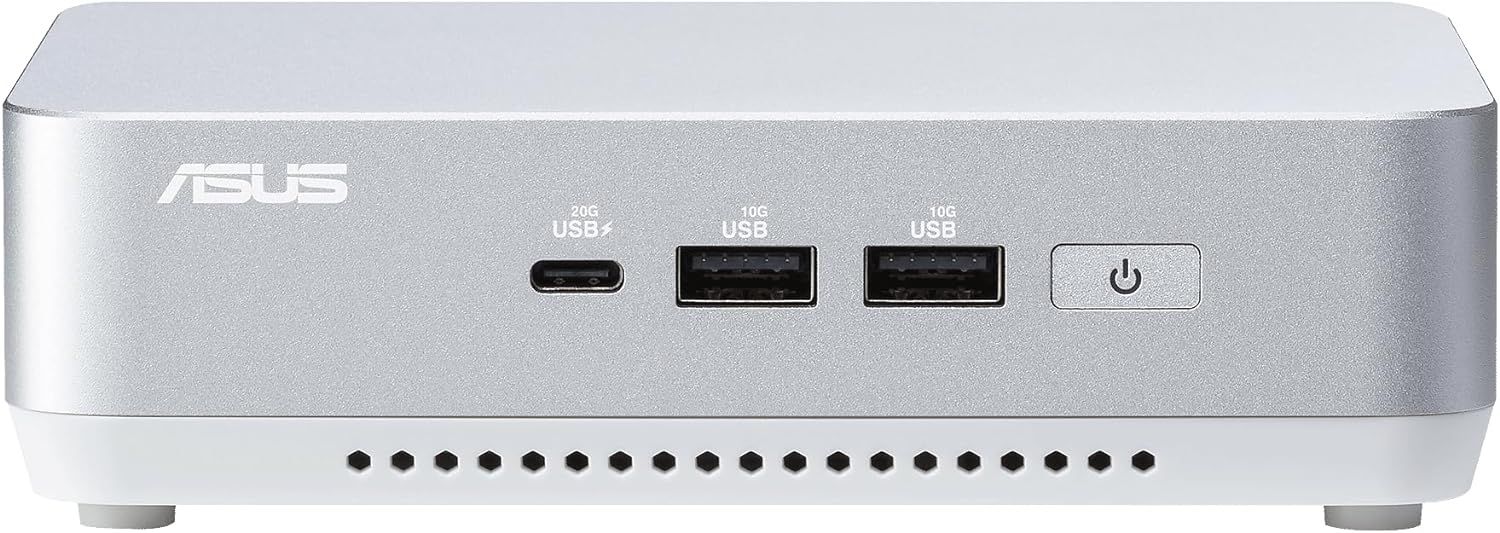
The ASUS NUC 14 Pro+ Barebone represents the pinnacle of mini PC performance. Equipped with the top-tier Intel 14th Gen Core Ultra 9 185H processor, this powerhouse is designed for users who demand server-grade performance in a compact form factor. The barebone configuration allows for extensive customization, supporting up to 96GB of DDR5 RAM and multiple M.2 SSDs. This flexibility makes it ideal for power users who need to tailor their system to specific high-performance home server applications. The inclusion of NPU (Neural Processing Unit) support adds significant AI processing capabilities, opening up possibilities for advanced home automation, machine learning projects, and future AI-driven applications. Despite its small size, this NUC can rival the performance of much larger desktop systems, making it suitable for demanding tasks like running multiple virtual machines, real-time 4K video transcoding, or serving as a powerful development environment.
Features:
- Intel Core Ultra 9 185H processor (16 cores, 22 threads)
- Supports up to 96GB DDR5 RAM
- Multiple M.2 SSD slots for expansive storage
- Thunderbolt 4 connectivity
- Wi-Fi 6E and Bluetooth 5.3
- NPU support for AI-accelerated tasks
- Extensive I/O options including multiple USB and display ports
- Barebone configuration for maximum customization
Why it’s good for home server:
- Extreme performance capable of handling multiple demanding server roles
- Extensive RAM support for memory-intensive applications or multiple VMs
- Flexible storage options allow for high-capacity, high-speed configurations
- NPU support enables advanced AI and machine learning capabilities
- Thunderbolt 4 provides fast connectivity for external devices or networked storage
- Barebone setup allows for precise customization to specific needs
Why it might not be for others:
- High cost, especially when factoring in RAM and storage
- Overkill for basic home server needs like file sharing or simple web hosting
- Higher power consumption and heat generation compared to lower-end models
- Requires more technical knowledge to set up due to barebone configuration
- May be unnecessarily powerful for users not leveraging its full capabilities
AMD Mini PC
ACEMAGICIAN Dual LAN Mini Gaming PC AMD Ryzen 7 5800U
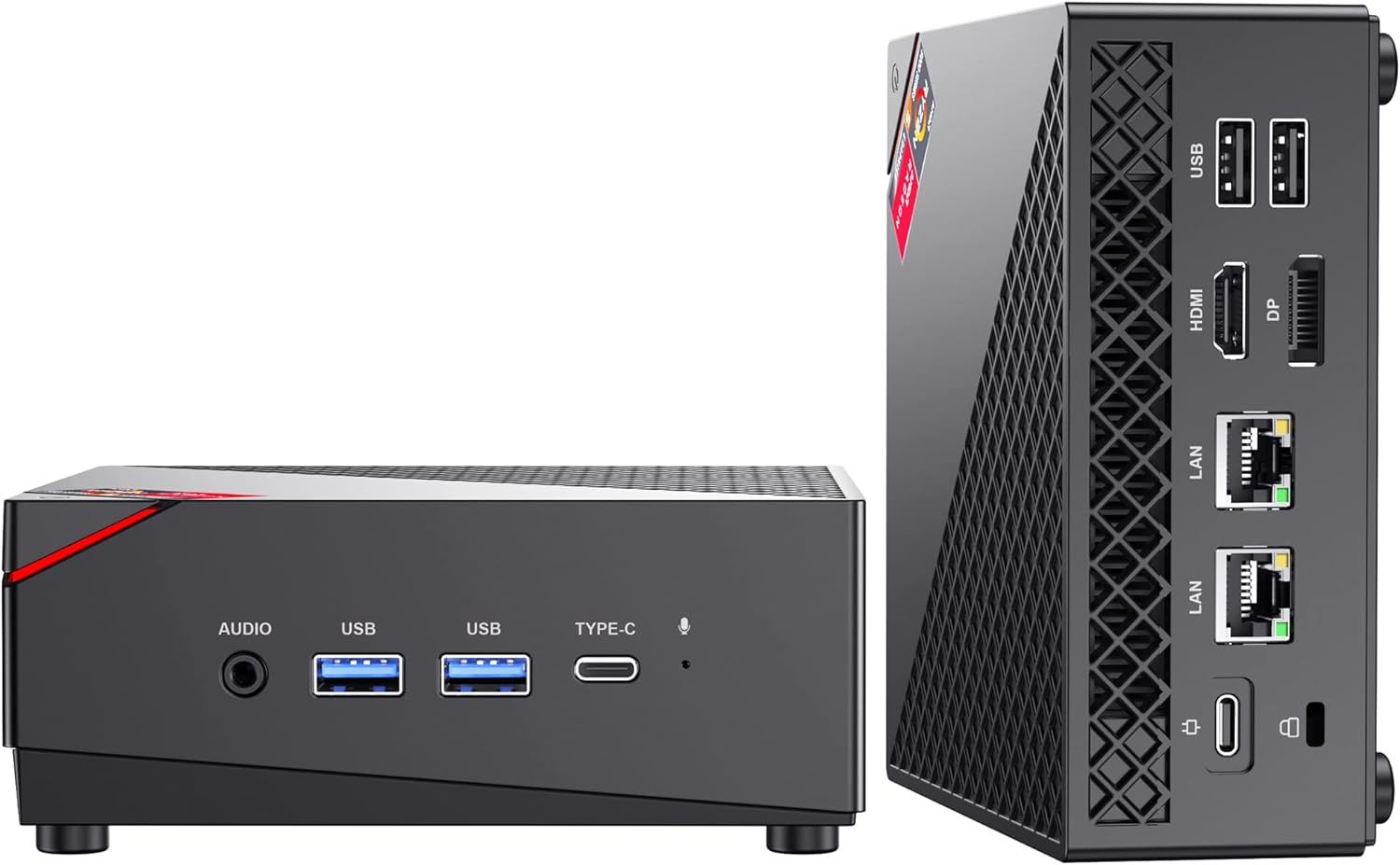
The ACEMAGICIAN Dual LAN Mini Gaming PC, powered by the AMD Ryzen 7 5800U processor, offers a compelling blend of performance and efficiency in a compact form factor. This 8-core, 16-thread processor provides robust multitasking capabilities, making it well-suited for various home server applications. The mini PC’s dual LAN ports are a standout feature, offering enhanced network performance and redundancy options crucial for a reliable home server setup. With 16GB of DDR4 RAM and a 512GB SSD, it provides ample resources for running multiple server applications simultaneously. While marketed as a gaming PC, its specifications make it equally adept at serving as a powerful home server. The combination of AMD’s energy-efficient architecture and high core count allows this mini PC to handle demanding tasks like media transcoding, virtualization, and running multiple docker containers with ease.
Features:
- AMD Ryzen 7 5800U (8 cores, 16 threads)
- 16GB DDR4 RAM
- 512GB SSD
- Dual Ethernet ports
- Wi-Fi 6 and Bluetooth 5.2
- Multiple USB ports including USB 3.2
- HDMI and DisplayPort outputs
- Compact form factor with gaming-inspired design
Why it’s good for home server:
- Powerful multi-core processor suitable for various server applications
- Dual LAN for improved network performance or redundancy
- Energy-efficient AMD architecture for 24/7 operation
- Capable of handling media transcoding and virtualization tasks
- Compact size allows for flexible placement options
- Good balance of performance and power consumption
Why it might not be for others:
- May be overkill for basic file sharing or simple web hosting needs
- Gaming-oriented design might not blend well in all home environments
- Potentially higher initial cost compared to entry-level mini PCs
- Lack of ECC RAM support (common in consumer-grade systems) may be a concern for critical data applications
GEEKOM AE7 Mini PC, AMD Ryzen 9 7940HS Processor AI Mini Computer

The GEEKOM AE7 Mini PC represents a significant leap in mini PC performance, featuring the high-end AMD Ryzen 9 7940HS processor. This powerhouse combines exceptional multi-core performance with integrated RDNA 3 graphics, making it suitable for a wide range of demanding home server applications. The “AI” designation hints at its capabilities in machine learning and AI-assisted tasks, thanks to AMD’s advancements in this area. Supporting up to 64GB of DDR5 RAM and multiple M.2 SSDs, this mini PC can be configured to handle intensive workloads such as running multiple virtual machines, real-time 4K video transcoding, or serving as a robust development environment. Its Thunderbolt 4 connectivity adds versatility for high-speed external devices or networking. Despite its powerful components, the AE7 maintains a compact form factor, making it an excellent choice for users who need server-grade performance in a small package.
Features:
- AMD Ryzen 9 7940HS Processor (8 cores, 16 threads)
- Supports up to 64GB DDR5 RAM
- Multiple M.2 SSD slots for expansive storage
- Thunderbolt 4 connectivity
- Wi-Fi 6E and Bluetooth 5.2
- RDNA 3 integrated graphics
- Extensive I/O options including multiple USB and display ports
- Compact design with efficient cooling system
Why it’s good for home server:
- High-performance processor capable of handling multiple demanding server roles
- Support for large amounts of fast DDR5 RAM, ideal for memory-intensive applications
- Flexible storage options allow for high-capacity, high-speed configurations
- Integrated RDNA 3 graphics can assist with GPU-accelerated tasks
- Thunderbolt 4 provides fast connectivity for external devices or networked storage
- Compact size despite powerful internals, suitable for space-constrained setups
Why it might not be for others:
- Higher cost compared to entry-level or mid-range mini PCs
- May be unnecessarily powerful for basic home server needs
- Potentially higher power consumption and heat output than lower-end models
- Overkill for simple file sharing, basic web hosting, or lightweight NAS applications
- The advanced features and performance may not be fully utilized by all users
Both these AMD-based mini PCs offer strong alternatives to Intel-based systems, providing excellent multi-core performance and energy efficiency. They are particularly well-suited for users who need to run multiple demanding applications simultaneously or require strong computational power for tasks like virtualization, media processing, or running complex home automation systems.
Best ARM Mini PC
Orange Pi 5 Plus 32GB with 256GB eMMC
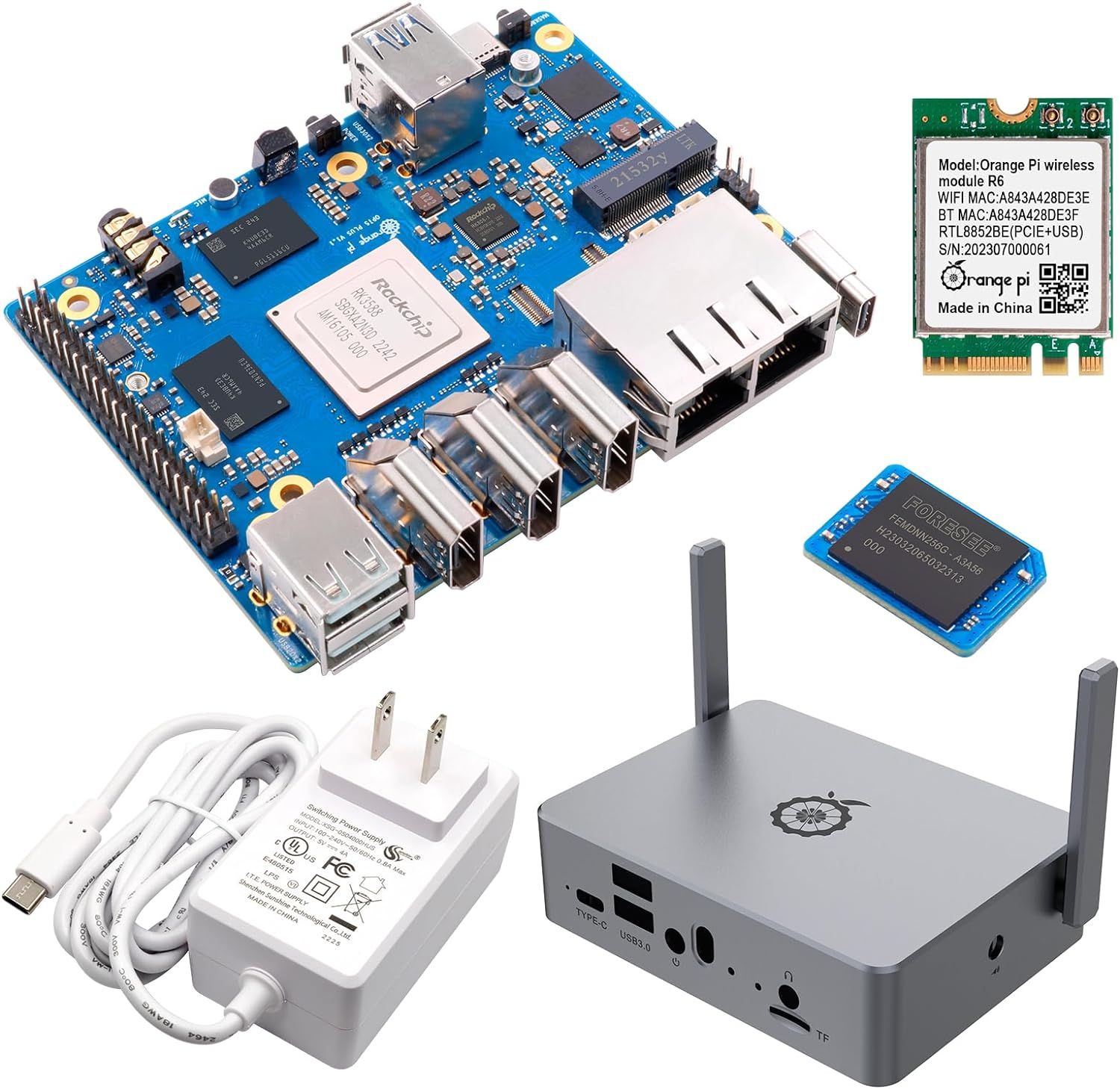
The Orange Pi 5 Plus represents a significant leap in ARM-based single-board computer performance. Powered by the Rockchip RK3588 octa-core processor, this board offers server-grade capabilities in a compact form factor. With 32GB of LPDDR4X RAM and 256GB of eMMC storage, it provides ample resources for running multiple server applications simultaneously. The dual Gigabit Ethernet ports make it an excellent choice for network-intensive tasks, while Wi-Fi 6 and Bluetooth support add versatility for various connectivity needs.
Features:
- Rockchip RK3588 octa-core 64-bit processor
- 32GB LPDDR4X RAM
- 256GB eMMC storage
- Dual Gigabit Ethernet ports
- Wi-Fi 6 and Bluetooth
- Multiple USB ports including USB 3.0
- Supports Orange Pi OS, Android, Debian, Ubuntu
- Comes with case, power supply, and remote control
Why it’s good for home server:
- High performance-to-power ratio for ARM-based systems
- Extensive RAM and storage for demanding applications
- Dual Ethernet ports for improved network capabilities
- Flexible OS options for various server configurations
- Great for development and experimentation
Why it might not be for others:
- May require more technical knowledge to set up compared to consumer-oriented mini PCs
- Some x86-specific applications may not be compatible
- Cooling may be necessary for intensive, continuous operation
CanaKit Raspberry Pi 5 Starter Kit PRO - Turbine Black
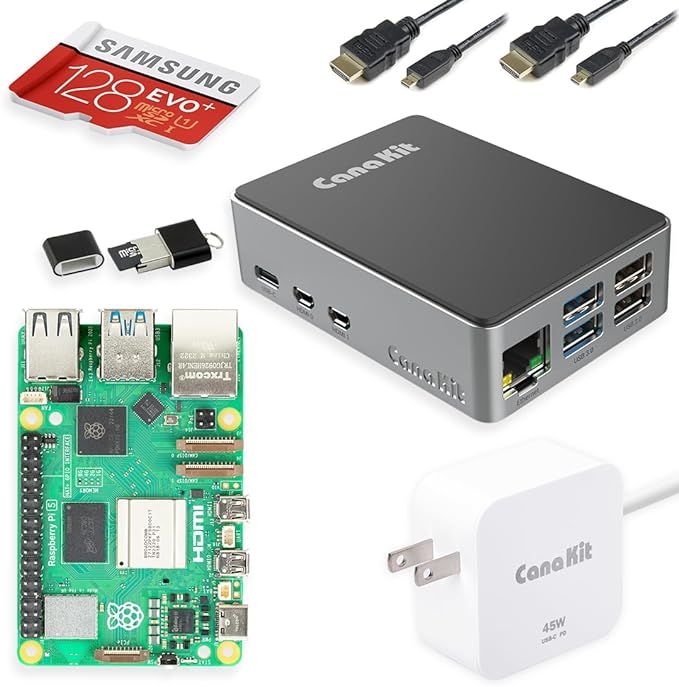
The Raspberry Pi 5, available in this comprehensive CanaKit Starter Kit PRO, represents a significant leap forward in ARM-based single-board computers. This latest iteration boasts impressive performance improvements over its predecessors, making it a compelling option for home server applications. The Raspberry Pi 5 is powered by a custom Broadcom BCM2712 quad-core 64-bit ARM Cortex-A76 processor, delivering up to 2-3 times the performance of the Raspberry Pi 4. With 8GB of LPDDR4X RAM and a 128GB high-speed microSD card, this kit provides ample resources for various server tasks. The inclusion of dual-band Wi-Fi 6 and Bluetooth 5.0 enhances its networking capabilities, while the dual micro-HDMI ports support dual 4K displays. The Turbine Black case with integrated fan ensures proper cooling for sustained performance. This Raspberry Pi 5 kit strikes an excellent balance between power efficiency, performance, and cost-effectiveness for home server enthusiasts.
Features:
- Broadcom BCM2712 quad-core ARM Cortex-A76 processor (up to 2.4GHz)
- 8GB LPDDR4X RAM
- 128GB microSD card included
- Dual-band Wi-Fi 6 and Bluetooth 5.0
- Dual Gigabit Ethernet ports
- 4 USB 3.0 ports
- Dual micro-HDMI supporting 4K60
- Turbine Black case with integrated fan for cooling
Why it’s good for home server:
- Excellent performance-to-power ratio, ideal for 24/7 operation
- Dual Gigabit Ethernet ports for improved network capabilities
- Extensive community support and wide range of ARM-compatible server software
- Low cost compared to x86 mini PCs with similar capabilities
- Compact size allows for flexible placement options
- Great platform for learning and experimenting with server technologies
Why it might not be for others:
- Limited CPU power compared to high-end x86 processors
- Some x86-specific server applications may not be compatible
- Performance may be insufficient for heavy virtualization or simultaneous 4K transcoding
- Limited storage expansion options compared to larger mini PCs
Apple 2023 Mac Mini Desktop Computer with Apple M2 chip with 8‑core CPU and 10‑core GPU
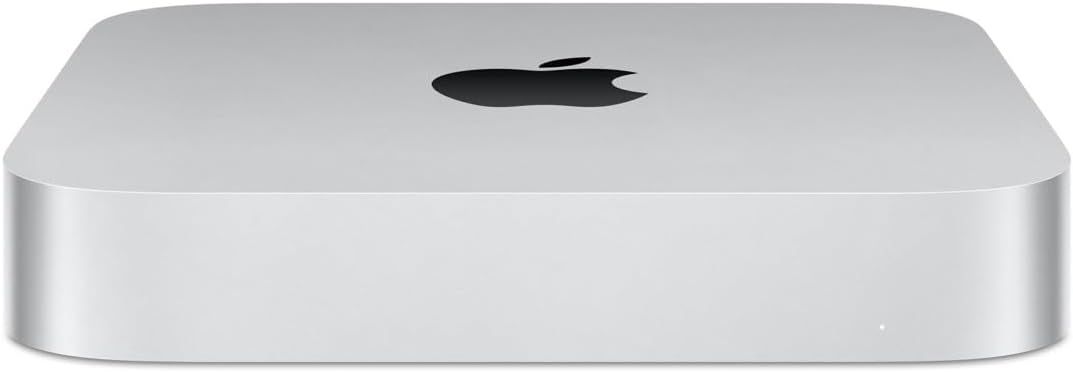
Description: The 2023 Apple Mac Mini with the M2 chip represents a powerful and energy-efficient option in the ARM-based mini PC market. Leveraging Apple’s custom silicon, this compact powerhouse offers exceptional performance and efficiency. The M2 chip features an 8-core CPU and a 10-core GPU, providing robust computing capabilities for various server tasks. While primarily designed as a desktop computer, its performance, silent operation, and energy efficiency make it an excellent candidate for a home server. The Mac Mini’s macOS environment offers a user-friendly interface and a wide range of server applications, making it accessible for both beginners and experienced users. With support for up to two displays, including one at 6K resolution, it also provides flexibility for setup and monitoring. The inclusion of Wi-Fi 6E and Bluetooth 5.3 ensures fast wireless connectivity options.
Features:
- Apple M2 chip with 8-core CPU and 10-core GPU
- 8GB unified memory (configurable up to 24GB)
- 256GB SSD (configurable up to 2TB)
- Wi-Fi 6E (802.11ax) and Bluetooth 5.3
- 2x Thunderbolt 4 ports, 2x USB-A ports, HDMI port
- Gigabit Ethernet (configurable to 10Gb Ethernet)
- Supports up to two displays (one up to 6K and one up to 4K)
- Compact design with efficient cooling
Why it’s good for home server:
- Exceptional performance-to-power ratio, ideal for energy-efficient 24/7 operation
- Silent operation due to efficient cooling system
- macOS provides a user-friendly environment for server setup and management
- Thunderbolt 4 ports offer high-speed connectivity for external storage or devices
- Ability to run iOS/iPadOS apps, expanding software options
- Time Machine support for easy backup solutions
Why it might not be for others:
- Higher cost compared to many x86 and ARM alternatives
- Limited upgradability (RAM and storage are not user-upgradeable)
- Some traditional server software may not be compatible with macOS or ARM architecture
- Less flexibility in terms of operating system choices compared to generic x86 hardware
- May be overkill for basic file sharing or simple web hosting needs
Both these ARM-based mini PCs offer unique advantages for home server setups. The Raspberry Pi 5 provides an affordable, highly customizable platform with a vast community and software ecosystem, ideal for learning and experimenting. The Apple Mac Mini with M2 chip, while more expensive, offers a powerful, energy-efficient solution with a user-friendly interface, making it suitable for those who prioritize ease of use and performance in their home server setup.
Best Use Cases
Mini PCs offer versatile solutions for home server applications. Here are some of the best use cases, categorized by the different types of mini PCs we’ve explored:
| Mini PC Type | Ideal Use Cases |
|---|---|
| Entry-Level x86 (N100) | Media streaming, Basic NAS, Home automation hub |
| Mid-range to High-end x86 | Virtualization, Advanced media server, Game server |
| ARM-based | Low-power 24/7 services, Educational projects, Lightweight containerization |
Entry-Level x86 (e.g., N100-based systems)
-
Media Streaming Server:
- Host Plex, Jellyfin, or Emby for personal media libraries
- Suitable for 1-2 simultaneous 1080p streams
-
Basic Network-Attached Storage (NAS):
- File sharing and backup solution for home networks
- Personal cloud storage alternative
-
Home Automation Hub:
- Run software like Home Assistant or OpenHAB
- Integrate and control smart home devices
-
Web Hosting:
- Host personal websites or small business sites
- Run content management systems like WordPress
-
VPN Server:
- Set up a personal VPN for secure remote access to your home network
Mid-range to High-end x86 (e.g., Intel NUC, AMD Ryzen Mini PCs)
-
Virtualization Server:
- Run multiple virtual machines for testing or development
- Host separate environments for different applications
-
Advanced Media Server:
- Handle multiple 4K transcoding streams
- Run more resource-intensive media management software
-
Game Server:
- Host multiplayer game servers for popular titles
- Support game streaming services like Steam Link
-
Development Environment:
- Run integrated development environments (IDEs) and compile code
- Host Git repositories and CI/CD pipelines
-
Database Server:
- Run SQL or NoSQL databases for personal or small business use
ARM-based (e.g., Raspberry Pi, Apple Mac Mini)
-
Low-Power 24/7 Services:
- DNS server (e.g., Pi-hole for network-wide ad blocking)
- MQTT broker for IoT devices
-
Educational Projects:
- Learn Linux system administration
- Experiment with server setup and management
-
Retro Gaming Emulation:
- Host retro gaming platforms and stream to other devices
-
Lightweight Containerization:
- Run Docker containers for various services
- Experiment with Kubernetes for container orchestration
-
Media Center:
- Use as a Kodi or OSMC box connected directly to a TV
Your N100-based mini PC with a 4TB SSD is particularly well-suited for media streaming and app hosting, as you’ve experienced. This setup can easily handle tasks like running a Plex server, hosting a few web applications, and serving as a file sharing hub for your home network. The large SSD provides ample space for media libraries and application data, making it an excellent all-in-one solution for many home server needs.
Remember that while these use cases are categorized by hardware type, there’s often overlap. The key is to match the hardware capabilities with your specific requirements and expected workload.
Conclusion
The world of mini PCs for home servers offers a diverse range of options, from budget-friendly ARM-based solutions like the Raspberry Pi to high-performance x86 powerhouses and energy-efficient ARM chips like Apple’s M2. Each category caters to different needs, budgets, and use cases.
As someone who owns and operates an N100-based mini PC for streaming and app hosting with a 4TB SSD, you’ve experienced firsthand the capabilities of these affordable yet capable devices. Your setup demonstrates that even entry-level x86 mini PCs can handle significant home server tasks effectively. The N100’s efficiency allows for 24/7 operation without excessive power consumption, while still providing enough performance for media streaming and hosting multiple applications.
Your choice of a large 4TB SSD also highlights an important aspect of home server setups: storage capacity is often as crucial as processing power. This configuration allows for extensive media libraries and ample space for various applications and their data.
Key takeaways:
- Entry-level mini PCs like those with the N100 can be sufficient for many home server needs, including media streaming and app hosting.
- Storage capacity is a critical factor in home server setups, often more so than raw processing power for many use cases.
- Energy efficiency is a significant advantage of newer mini PCs, allowing for cost-effective 24/7 operation.
- The right choice depends on specific needs: while an N100 works well for your streaming and app hosting, users with more demanding requirements might need to look at more powerful options like the Intel NUC or AMD-based systems.
- ARM-based solutions like the Raspberry Pi or Mac Mini offer unique advantages in terms of power efficiency and, in Apple’s case, integration with their ecosystem.
Ultimately, your experience validates that one doesn’t necessarily need high-end hardware to create a functional and efficient home server. The key is to match the hardware capabilities with your specific requirements. For many users, a setup similar to yours – an efficient x86 mini PC with ample storage – will provide an excellent balance of performance, capacity, and energy efficiency for their home server needs.
As technology evolves, we can expect even more powerful and efficient options in the mini PC space, further expanding the possibilities for home servers. However, your current setup demonstrates that today’s entry-level hardware is already capable of meeting many home server demands effectively.
FAQs
-
Q: Can I use a mini PC as a 24/7 home server? A: Yes, many mini PCs are designed for continuous operation and are energy-efficient, making them suitable for 24/7 use.
-
Q: How much RAM do I need for a home server? A: For basic tasks, 8GB is sufficient. For more demanding applications or virtualization, consider 16GB or more.
-
Q: Are ARM-based mini PCs good for home servers? A: ARM-based systems like the Raspberry Pi are excellent for low-power, always-on servers and are particularly good for learning and experimentation.
-
Q: Can I upgrade the components in a mini PC? A: It depends on the model. Some mini PCs allow RAM and storage upgrades, while others have fixed configurations.
-
Q: Is it better to build a custom server or use a mini PC? A: Mini PCs offer a compact, energy-efficient, and often more cost-effective solution for home servers compared to custom builds, especially for basic to moderate server needs.
Related Posts

Top 100+ Linux Commands You MUST Know
Unlock the full potential of Linux with this essential guide to the top 100+ commands. Enhance your command-line skills, improve productivity, and master the Linux environment with these must-know commands and tips.

How to Manage Applications with PM2: A Complete Guide
Learn how to use PM2, a powerful and easy-to-use process manager for Node.js, to run and monitor your applications in production. Whether you are using Node.js, Python, or any other language, PM2 can help you improve the scalability, performance, and reliability of your applications.
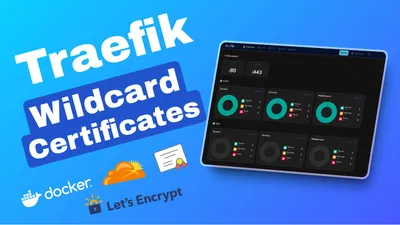
Traefik FREE Let's Encrypt Wildcard Certificate With CloudFlare Provider
Let's see how we can configure Traefik as a reverse proxy and get an Wildcard SSL certificate via DNS Chalange with Claudflare Provider